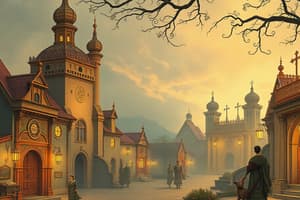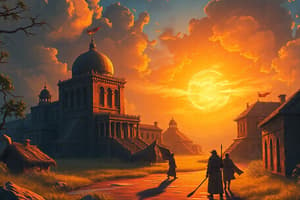Podcast
Questions and Answers
What is the primary focus of the study of history?
What is the primary focus of the study of history?
- The analysis of literary texts.
- The study of past events, societies, and civilizations. (correct)
- The compilation of statistics and data.
- The exploration of future events and predictions.
Which period marks the beginning of recorded history?
Which period marks the beginning of recorded history?
- Ancient History (correct)
- Middle Ages
- Classical Antiquity
- Prehistory
What characterizes Classical Antiquity?
What characterizes Classical Antiquity?
- Development of empires like Roman and Persian. (correct)
- Emergence of capitalism as the dominant economic system.
- Invention of writing and urbanization.
- Rise of feudalism and Christianity.
During which historical period did the Renaissance occur?
During which historical period did the Renaissance occur?
What is a primary source in historical studies?
What is a primary source in historical studies?
How does historiography differ from general historical study?
How does historiography differ from general historical study?
Which of the following represents a significant theme in history?
Which of the following represents a significant theme in history?
What major event did Mahatma Gandhi lead in India?
What major event did Mahatma Gandhi lead in India?
Flashcards are hidden until you start studying
Study Notes
Key Concepts in History
Definition of History
- Study of past events, societies, and civilizations.
- Uses various sources: documents, artifacts, oral traditions.
Importance of History
- Understanding of human behavior and societal development.
- Lessons from past successes and failures.
- Context for contemporary issues.
Historical Periods
-
Prehistory
- Time before written records.
- Study of evolution, early humans, and prehistoric cultures.
-
Ancient History
- Begins with the invention of writing (circa 3000 BCE).
- Key civilizations: Mesopotamia, Ancient Egypt, Indus Valley, China, Mesoamerica.
-
Classical Antiquity
- Approx. 500 BCE to 500 CE.
- Rise of empires: Roman, Persian, Mauryan, and Han.
- Development of philosophy, science, and art.
-
Middle Ages
- 500 CE to 1500 CE.
- Feudalism, the rise of Christianity and Islam.
- Cultural and scientific advancements (e.g., the Renaissance).
-
Modern History
- 1500 CE to present.
- Age of exploration, revolutions (American, French, Industrial).
- Global conflicts: World Wars, Cold War.
Historical Methodology
-
Source Analysis
- Primary sources: firsthand accounts (documents, artifacts).
- Secondary sources: interpretations and analyses of primary sources.
-
Critical Thinking
- Evaluate reliability and bias of sources.
- Contextualize events within socio-political environments.
-
Historiography
- Study of how history has been written and interpreted.
- Different historical perspectives (e.g., Marxist, feminist, post-colonial).
Significant Historical Figures
-
Julius Caesar
- Roman general and statesman, pivotal in the transition from Republic to Empire.
-
Cleopatra
- Last active ruler of the Ptolemaic Kingdom of Egypt, known for her alliances with Rome.
-
Mahatma Gandhi
- Leader of Indian independence movement against British rule through nonviolent resistance.
-
Nelson Mandela
- Anti-apartheid revolutionary and first black president of South Africa, advocate for equality.
Themes in History
-
Cultural Exchange
- Spread of ideas, religion, and technology across civilizations.
-
Conflict and Cooperation
- Wars, alliances, and treaties shaping geopolitical landscapes.
-
Economic Systems
- Evolution from barter to capitalism; impact on societies.
-
Social Structures
- Class, caste, gender roles, and their influence on history.
Useful Terms
- Chronology: Timeline of historical events.
- Archaeology: Study of human history through excavation of sites.
- Anthropology: Study of humans, their behavior, and societies.
- Colonialism: Control by one power over a dependent area or people.
Conclusion
- History is essential for understanding human society and its complexities. It provides insights into contemporary issues by analyzing past events and their consequences.
Key Concepts in History
Definition of History
- Involves the study of past events, societies, and civilizations, employing various sources like documents, artifacts, and oral traditions.
Importance of History
- Provides insight into human behavior and the development of societies.
- Offers valuable lessons from historical successes and failures that inform present challenges.
- Contextualizes contemporary issues by analyzing historical precedents.
Historical Periods
Prehistory
- Refers to the era before written records existed; focuses on human evolution and prehistoric cultures.
Ancient History
- Commences around 3000 BCE with the development of writing.
- Major civilizations include Mesopotamia, Ancient Egypt, the Indus Valley, China, and Mesoamerica.
Classical Antiquity
- Encompasses the period from approximately 500 BCE to 500 CE.
- Features the rise of notable empires, such as Roman, Persian, Mauryan, and Han, with advancements in philosophy, science, and art.
Middle Ages
- Spanning from 500 CE to 1500 CE, marked by feudalism and the rise of Christianity and Islam.
- Notable for cultural and scientific advancements, leading into the Renaissance.
Modern History
- Covers the period from 1500 CE to the present, including the Age of Exploration, significant revolutions (American, French, Industrial), and global conflicts like the World Wars and the Cold War.
Historical Methodology
-
Source Analysis
- Primary sources provide firsthand accounts through documents and artifacts, while secondary sources offer interpretations and analyses.
-
Critical Thinking
- Emphasizes evaluating the reliability and bias of sources, while contextualizing events within their socio-political environments.
-
Historiography
- Involves the study of how history has been documented and interpreted, highlighting different perspectives such as Marxist, feminist, and post-colonial approaches.
Significant Historical Figures
- Julius Caesar: Influential Roman general and statesman who played a crucial role in transforming the Roman Republic into the Roman Empire.
- Cleopatra: The last prominent ruler of the Ptolemaic Kingdom of Egypt, recognized for her strategic alliances with Rome.
- Mahatma Gandhi: Led India's independence movement against British colonization through principles of nonviolent resistance.
- Nelson Mandela: Anti-apartheid revolutionary and South Africa's first black president, celebrated for his advocacy for equality and reconciliation.
Themes in History
- Cultural Exchange: Examines the transmission of ideas, religions, and technologies among civilizations.
- Conflict and Cooperation: Investigates how wars and alliances have shaped geopolitical landscapes.
- Economic Systems: Studies the evolution from barter systems to capitalism and its societal implications.
- Social Structures: Analyzes the influence of class, caste, and gender roles throughout history.
Useful Terms
- Chronology: The organization of historical events along a timeline.
- Archaeology: The discipline focused on understanding human history through site excavations.
- Anthropology: The study of humans, their actions, and social structures.
- Colonialism: The practice of one power exerting control over another territory or populace.
Conclusion
- History is vital for grasping the complexities of human society, providing insights into current issues by examining past events and their ramifications.
Studying That Suits You
Use AI to generate personalized quizzes and flashcards to suit your learning preferences.




